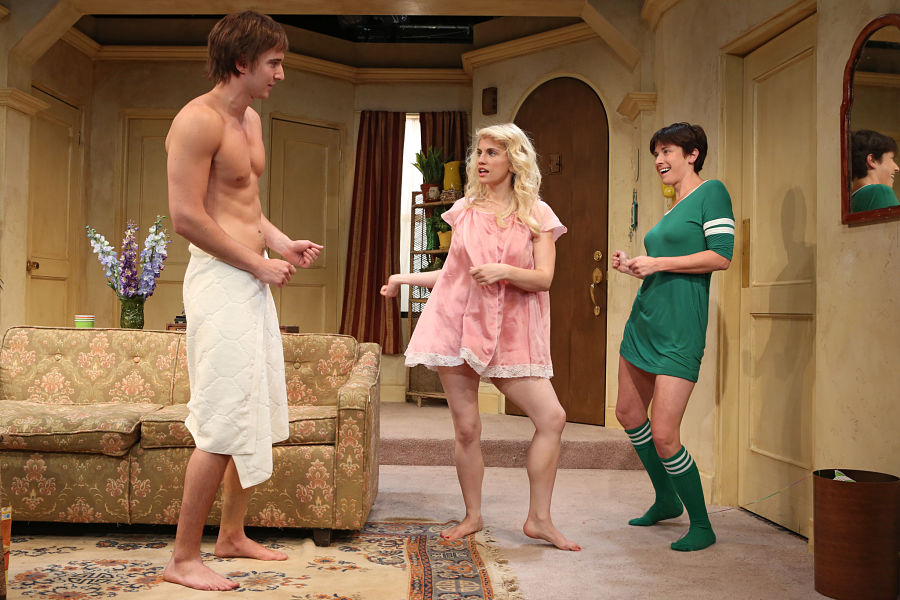NEW YORK CITY: David Adjmi’s legally embattled play 3C does not violate the copyright of “Three’s Company,” according to a ruling by Judge Loretta A. Preska of the United States District Court, Southern District of New York yesterday. The ruling—in which the judge wrote that “despite the many similarities between the two, 3C is clearly a transformative use” of the ’70s sitcom—means that the play can now be published, licensed and performed beyond its initial run at Rattlestick Playwrights Theater in the summer of 2012.
It also brings to a close—at least for now—a three-year legal battle that pitted Adjmi, an acclaimed New York playwright, against DLT Entertainment Ltd., which owns the copyright to the sitcom.
3C’s troubles began on opening night of its premiere at Rattlestick, when the play’s producers were served with a cease-and-desist letter from DLT alleging that the play, a darkly parodic deconstruction of “Three’s Company,” infringed on the show’s copyright. The production went forward as planned, but, with the cease-and-desist order in place, the play could neither be published nor licensed for further production. Despite widespread support and reviews that, while mixed, made it clear that 3C was a transformative rather than a derivative work, Adjmi lacked the funds to fight the order.

“It was horrible,” Adjmi says. “No one would help me.” No one, that is, but the playwright Jon Robin Baitz, who put Adjmi in touch with New York Times theatre reporter Patrick Healy and started a petition on Adjmi’s behalf, which was signed by many in the industry, including “some fancy people, too, like Stephen Sondheim and Aaron Sorkin and Tony Kushner,” Adjmi says.
The petition and the press coverage led TCG’s Teresa Eyring to put Adjmi in touch with the law firm of Davis Wright Tremaine, who took the case pro bono. As Bruce Johnson, Adjmi’s counsel, put it, “We took this on a pro bono basis because we care deeply about the theatre,” and felt that “meritless legal claims should not be used to block free speech.”
According to Johnson, “DLT was hoping that its greater financial resources would overmatch whatever legal help David could find, if anyone.” Noting that DLT Entertainment had “dragged various theatres into the lawsuit demanding huge damages from them,” Johnson says that he was “shocked… because it was clearly intended to have an effect on David and his efforts to protect his free speech rights.” (Along with Rattlestick, DLT named Rising Phoenix Repertory and piece by piece productions, who participated in the play’s development and production, as defendants.)
After Adjmi received inquiries about producing and publishing 3C, he sued DLT to get the cease-and-desist lifted, arguing that 3C falls squarely in the tradition of parody and fair use, and thus does not violate “Three’s Company’s” copyright.
United States copyright law is, as Judge Preska put it, “as much art as science,” generally relying on judges to balance the interests of copyright holders with the interests of other creators. In judging whether or not a usage of copyrighted material is fair, judges weigh four factors: the purpose and character of the use, the nature of the copyrighted work, the amount and portion of the copyrighted work used, and the effect of the use upon the potential market or value of the copyrighted work.
In ruling for Adjmi, Judge Preska quotes the Supreme Court’s ruling in Campbell v. Acuff-Rose Music Inc., which states that “parody needs to mimic the original to make its point, and so has some claim to use the creation of its victim’s… imagination.” Thus, even as “the parties agree 3C copies the plot premise, characters, sets, and certain scenes from ‘Three’s Company,’ ” by deconstructing them and parodying them, 3C “us[es] the familiar ‘Three’s Company’ construct as a vehicle to criticize and comment on the original’s lighthearted, sometimes superficial, treatment of certain topics and phenomena.” Judge Preska further declared that as “a drastic departure,” 3C “poses little risk to the original… Equating the two to each other as a thematic or stylistic matter is untenable.”
After receiving the news yesterday, Adjmi spent last night composing a lengthy list of thank-yous for to his Facebook page, which included everyone from the Dramatists Guild to his lawyers, to the critic Ben Brantley, “who gave me a rave review for it in the Times couched in a pan for another play.”
Reached for comment in Rome, Adjmi notes that he’s “gotten a bunch of requests to read the play, but we’ve had to say no to everyone for legal reasons. It’s a crazy play. I’ll be very curious to see who does it and how it gets staged.”
At the heart of the case is an open question that’s proven fraught within media and the arts. As copyright law seems to keep expanding, both in the length of copyright terms and in the definition of infringement, how do artists make work that responds to and speaks to our culture when so many of its products are entangled with rights concerns?
Adjmi has sympathy for both sides of this question. On the one hand, he says, “If we can’t dig deeply into our own psyches and pull out… God knows what, Suzanne Somers, or a urinal if you’re Duchamp, or if you’re John Currin, a Penthouse Forum spread—whatever resides there, whatever it is, it’s part of us now. If we can’t work with the imprints of these things that reside in us and make meaning with them, we’re being cut off at the knees.”
On the other hand, as a published author himself, Adjmi concedes, “I worry about the other extreme too—that people are going to flirt with fair use in a really crude way, in a kind of gross, mercenary way. I hope this doesn’t open the door for that sort of thing.”
For his part, Johnson sees the verdict as a validation of an artistic tradition much older than our nation, let alone our copyright regime.
“Aristophanes’ The Frogs, which opened in 405 BC, was a parody of other plays,” Johnson notes. “Shakespeare’s Hamlet includes a parody of Christopher Marlowe, one of Shakespeare’s competitors. The first great novel in the English language, Pamela, was immediately followed by the parody, Shamela. Parody survives the development of modern copyright laws. ”
This may not be the last act of the story: DLT has 30 days to appeal the ruling. In the meantime, though, the publishing and licensing of 3C can go ahead (it will be released next fall by TCG Books, in a collection alongside Adjmi’s Marie Antoinette), while Adjmi continues with a number of other writing projects: a memoir for HarperCollins, two new plays (including one for director Daniel Aukin) and television work.
Whether or not those latter efforts have a shot of entering the cultural subconscious like a certain tittery citizen of TV Land, Adjmi is ready to move on. He could be speaking of his writing workload or of the legal struggle he just went through when he says, “I’m tired, but it’s good.”


